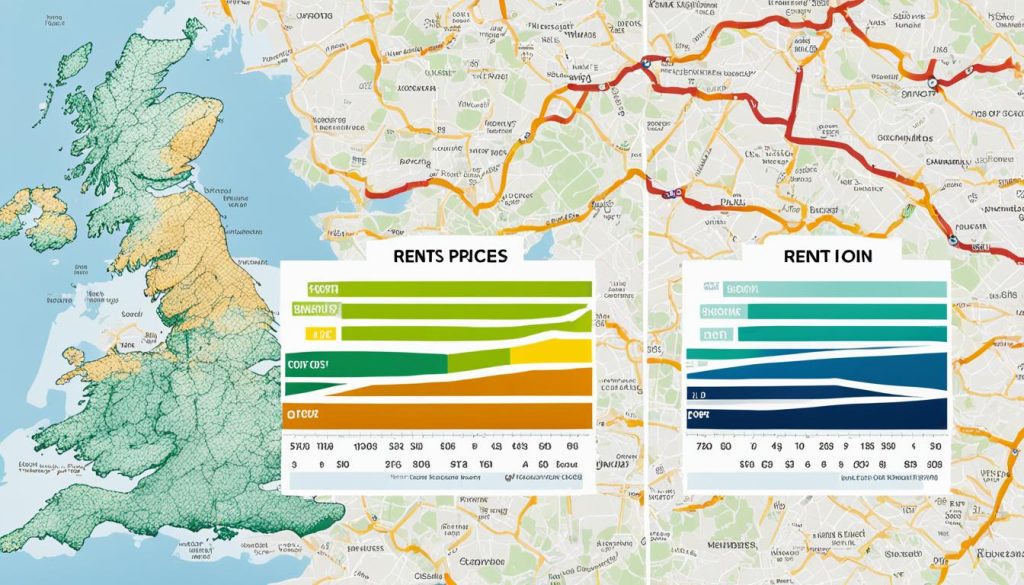Temporary accommodation is for people who are homeless or need a place quickly. It includes hostels, bed and breakfasts, and short-term leases. The cost of temporary housing varies greatly, depending on location, type of accommodation, and services provided. Here, we’ll discover how much rent is in temporary accommodation in the UK.
Understanding Temporary Accommodation
For those in the UK without a stable home, temporary accommodation is a vital support. It offers a short-term fix while people await a more lasting solution. Knowing about temporary housing options, types of interim accommodation, and short-term living arrangements is key. This is true for those needing transitional dwelling options or emergency housing choices.
What is Temporary Accommodation?
It can be many things, like a shared house room or a private landlord’s flat. It can also be a short-term council tenancy or a place in a hostel. The main thing is, it’s meant to be a short-term fix while people look for a more permanent home.
Types of Temporary Accommodation
- Shared accommodation, such as a room in a shared house or flat
- Self-contained accommodation, such as a flat or house rented from a private landlord
- Short-term council or housing association tenancies
- Hostels, refuges, or other supported housing options
Families with kids should get their own place to live, with space for cots for babies. People escaping domestic abuse must not share rooms with others of the opposite sex.

| Accommodation Type | Average Weekly Cost |
|---|---|
| Shared Accommodation | £80 – £100 |
| Supported Accommodation | £200 – £250 |
| Hotel Accommodation | £100 – £110 |
The cost of temporary housing can change a lot. This depends on where it is, what it offers, and the services you get. It’s important for people and families to know their choices and what they cost when looking for temporary homes.
How Much is Rent in Temporary Accommodation in the UK?
The cost of renting temporary accommodation in the UK varies a lot. In London, it can be from £40 to over £200 per night. Outside London, it’s usually cheaper, from £25 to £150 per night. The type of accommodation greatly affects the price.
Variations by Accommodation Type
Shared accommodation is the cheapest, costing £80 to £100 a week. Supported accommodation, with extra services, is £200 to £250 a week. Hotel-style temporary accommodation is £100 to £110 a week.
Shared Accommodation Cost
For those on a tight budget, shared temporary accommodation is a good choice. It includes hostels or shared houses. Prices are between £80 and £100 a week, making it affordable for many.
Supported Accommodation Cost
Supported temporary accommodation offers more than just a place to stay. It has services and support for specific needs. Prices are higher, from £200 to £250 a week, due to the extra support.
Hotel Accommodation
Hotels are another option for temporary housing. They are pricier, with weekly costs from £100 to £110.
Remember, these prices are just estimates and can change. Location, amenities, and your situation can affect the cost. It’s key to look into all your options and see what financial help is available. This way, you can find a place that’s both suitable and affordable.

Factors Affecting Rent in Temporary Accommodation
The cost of temporary accommodation in the UK is affected by several key factors. These include location, type of accommodation, and the amenities and services provided. Knowing these can help people and families find affordable temporary housing.
Location
Location is a big factor in setting temporary accommodation rent. Cities like London have high housing costs because of high demand and limited supply. The specific area within a city can also affect rent, with better areas costing more.
Economic conditions in different areas can also change temporary accommodation rates. Places with strong job markets and economies tend to have higher rent prices. This is because more people want to live there. Currency exchange rates can also affect costs when looking at places abroad.
Type of Accommodation
The type of temporary accommodation greatly affects its cost. Options like hotels, serviced apartments, hostels, and short-term rentals have different prices and features. Things like luxury features and being close to landmarks can make some places more expensive.
Amenities and Services
The amenities and services offered in temporary accommodation can change its price. Places that include utilities, meals, or support services usually cost more. Security, maintenance, and access to facilities can also add to the cost.
Understanding these factors helps people make better choices when looking for temporary housing. Thinking about location, accommodation type, and amenities can lead to a more affordable and suitable place to stay.

Financial Support for Temporary Accommodation
If you’re worried about paying rent in temporary accommodation, there are ways to get help. You might get Housing Benefit or the housing part of Universal Credit to cover your rent. You can also ask for Discretionary Housing Payments from your local council if you’re already getting housing benefit or Universal Credit but need more money. Some councils have their own schemes to help with housing costs or deposits.
Housing Benefit and Universal Credit
You could get housing benefit if you live in a homeless hostel, refuge, or certain types of supported or temporary housing from the council. This benefit covers your rent, even if you’re getting Universal Credit for other expenses. Supported housing might be independent units or shared houses where you need staff support to qualify for the benefit. Only landlords from housing associations, charities, voluntary groups, or county councils can get housing benefit.
Discretionary Housing Payments
If you’re already getting housing benefit or Universal Credit but find it hard to pay your rent, you can ask for Discretionary Housing Payments from your local council. This extra money can help bridge the gap between your rent and your benefits.
Council Support Schemes
Some councils have their own schemes to help with housing costs or deposits for temporary accommodation. These schemes offer grants or loans to make moving into temporary housing easier and cheaper.

Managing Costs and Seeking Advice
Budgeting for temporary housing can be tough, but there are ways to keep costs down. Keep track of your spending and focus on what you really need. This helps you handle the costs of emergency or temporary housing.
Start by making a budget for all your housing costs, like rent, deposits, and extra fees. Look into financial help like housing benefit or universal credit. These can really help with your expenses.
- Carefully track your income and expenses to identify areas where you can cut back or optimise your spending.
- Prioritise essential expenses like food, utilities, and transportation, and look for ways to reduce non-essential costs.
- Investigate government schemes and local council support programmes that may offer financial aid or guidance on managing the costs of temporary accommodation.
Getting advice from groups like Citizens Advice and Shelter is very helpful. They can tell you about your rights as a tenant or licensee. They also offer advice on talking to landlords or the local council.
By budgeting well, looking into financial help, and getting advice, you can handle the costs of temporary housing. This makes your living situation more stable and affordable during this time.
| Financial Support Options | Eligibility Criteria | Potential Benefits |
|---|---|---|
| Housing Benefit | Low income, savings under £16,000 | Covers all or part of rent costs |
| Universal Credit | Low income, limited savings | Includes housing element to help with rent |
| Discretionary Housing Payments | Receive housing benefit or universal credit, facing exceptional financial difficulties | Additional financial assistance for housing costs |
| Council Support Schemes | Varies by local authority, typically low-income households | Tailored support for housing and living expenses |
Conclusion
The cost of rent in temporary accommodation can be a big worry. But, knowing your options and where to get help can really help. Staying informed and getting the right advice can make things easier during this tough time.
You’re not alone in this struggle. Places like Shelter offer legal advice and support. They help you make smart choices about where you live temporarily.
Research shows that rent for temporary places to stay varies a lot across the UK. It’s higher in London and for some types of accommodation. But, there’s help available through Housing Benefit, Universal Credit, and Discretionary Housing Payments. Councils and support groups also have programs to help with these costs.
To sum up, here are some tips for dealing with temporary housing costs in the UK. Stay up to date with the local housing market, use all the financial support you can, and get advice from trusted groups. Knowing about temporary accommodation costs and the help out there lets you make better choices and feel more confident.
FAQ
What is temporary accommodation?
Temporary accommodation is a place to stay while you look for a permanent home. It can be a shared house, a flat from a private landlord, or a short-term tenancy. It also includes hostels, refuges, and other supported housing options.
What types of temporary accommodation are available?
You can find various temporary housing options. These range from hostels and bed and breakfasts (B&Bs) to short-term leases in flats or houses.
How much is rent in temporary accommodation in London compared to outside London?
In London, rent for temporary accommodation can be quite high, from £40 to over £200 per night. Outside London, it’s generally cheaper, from £25 to £150 per night.
What are the typical costs for different types of temporary accommodation?
The price of temporary accommodation varies by type. Shared places cost about £80 to £100 a week. Supported accommodation is pricier, at £200 to £250 weekly. Hotels are the most expensive, at £100 – £110 weekly.
What factors affect the cost of temporary accommodation?
The cost depends on the location, accommodation type, and what amenities and services are included.
What financial support is available for temporary accommodation?
You might get Housing Benefit or the housing part of Universal Credit. Some councils offer Discretionary Housing Payments or specific support schemes.
How can I manage the costs of temporary accommodation?
To keep costs down, budget carefully and track your spending. Prioritise what you need to pay for. Getting advice from groups like Citizens Advice and Shelter can help you find support and understand your rights.






